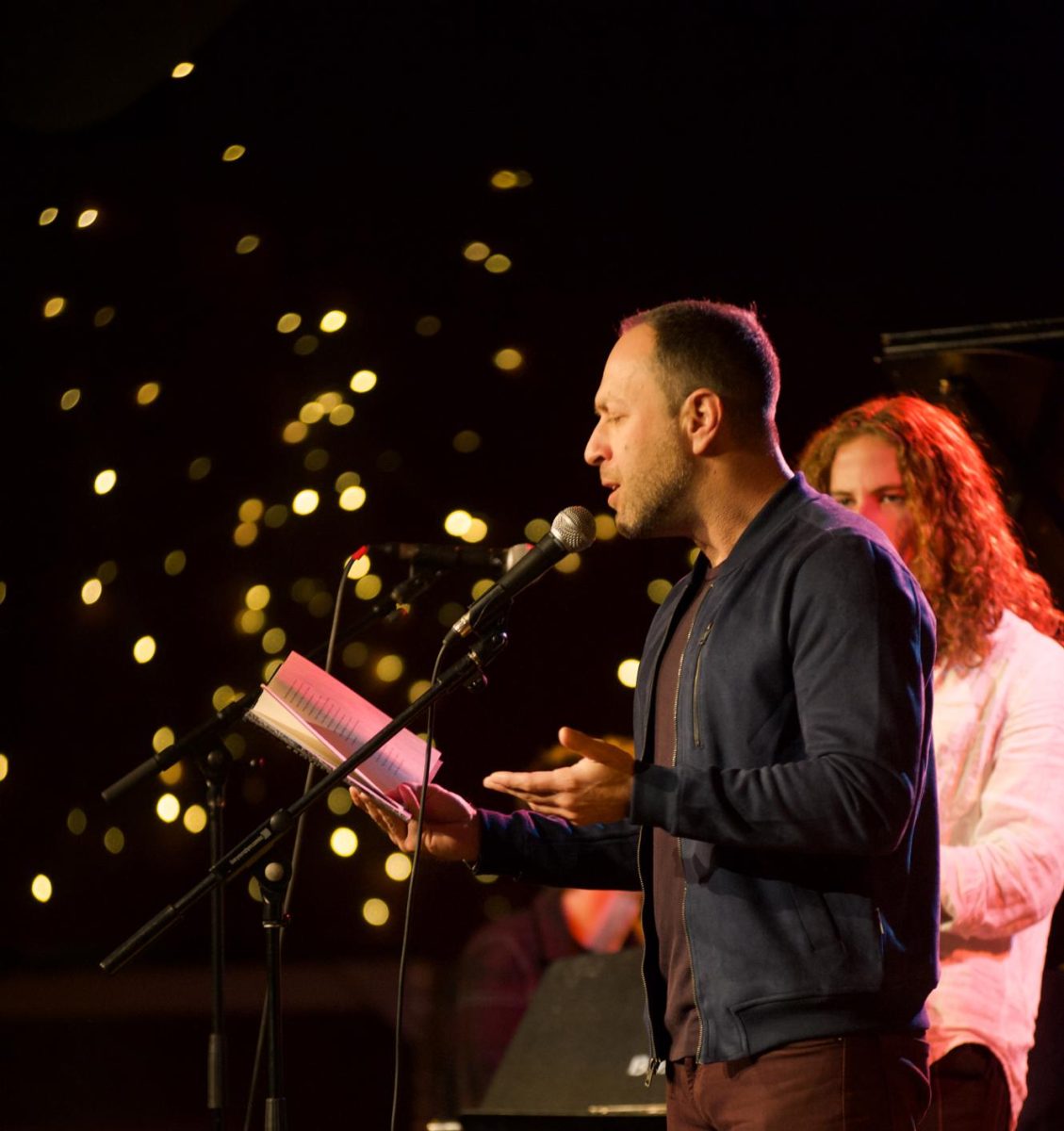Editor’s note: this piece contains mentions of suicide.
On Monday at the Cat in the Cream, author Adam Mansbach delivered an immersive reading of his book I Had a Brother Once with musical accompaniment led by his nephew, double-degree second-year Max Kassoy. Mansbach’s memoir-poem depicts his struggle with grief and search for ritual in the wake of his brother David’s suicide. David died just over two weeks before the publication of Mansbach’s satirical children’s book Go the F**k To Sleep. On a busy publicity tour, Mansbach was forced to grapple with the David he thought he knew and the David who fought a secret battle with depression.
As soon as Mansbach opened his book, the Cat transformed. Mansbach’s colorful poetry paired with suave jazz honeyed the air and brought the audience along through Mansbach’s passages of grief. He spoke almost as if he were rapping, pumping his free hand to the beat of his words. Although Mansbach sports a long list of literary accomplishments, including being a New York Times bestselling author, he maintained a down-to-earth presence that had the audience alternating between laughter and tears.
After two hours of speaking, Mansbach closed his book. “That’s it,” he declared simply, before the Cat sounded with applause.
For Mansbach, writing I Had a Brother Once had been a long time coming, even though his mother had asked him not to write about David’s suicide. Ultimately, he had to write the book for himself.
“I spent about eight years not writing the book,” Mansbach said. “I think I knew on some level that I always was going to, and had to, write about my brother and this entire experience, but I think it took me a long time to emotionally do that.”
Although Mansbach wrote the book for himself, he found that his story offered a language for dealing with grief to a larger audience.
“I never really think too deeply about audience when I write something,” he said. “I fundamentally write for myself and then hope that if I connected deeply enough with some s**t that I’m writing, then maybe someone else will connect with it as well. But as it turns out, I think a large part of the audience is people who have dealt with suicide and are looking for some kind of resonance.”
Once Mansbach found the courage to write, he wrote the entire book in only three weeks.
“I’ve never really been in a state like that before,” Mansbach said, reflecting on his writing process. “I’m very allergic to people romanticizing [the] artistic process or … making it seem obscure and fanciful and mystical. But this s**t was some mystical s**t.”
The book debuted in 2021 right in the midst of the pandemic. Thus, Mansbach did not get to perform his reading with musical accompaniment as he had always imagined it.
“Writing is a solitary thing, but I’m also always looking for ways to collaborate,” he explained. “Music is kind of the natural place to add another dimension into the book project, so in this case, I’d always thought of performing the book with musicians.”
Mansbach’s poetry blended seamlessly with the music, which is why it was surprising to learn that a lot of the jazz was improvised. There was a logic behind the musical choices, though, as Kassoy explained.
“Adam and I went through the whole book and found some sectional stuff, almost thinking of it like vignettes; there are these sections of the book and cycles within the larger cycle,” Kassoy said. “We identified some of those and tried to think of vague musical shapes that could happen within those, like themes.”
Mansbach’s memoir did not follow a defined plotline, strengthening the emotional effect on College second-year Cuillin Wise.
“I enjoyed that it was not just a linear story of grief, and we got to take these little detours throughout the author’s life,” Wise said. “When he talked about how the voice is the first thing you forget, I think I almost choked up for a second.”
I have attended several readings at Oberlin and found them all to be engaging. However, I’ve never attended a reading with musical accompaniment. I found this experimentation with form to be novel and successful. It would have been easy for Kassoy and the other performers to steal the spotlight from Mansbach’s reading, but they paid great attention to his story and cadence. They would even stop playing at certain moments to shift the focus to a particularly striking stanza.
“I selected a band that is very literary and are all good listeners,” Kassoy said. “In particular, [double-degree second-year] Ruby Laks is a writer and poet, so she is good at listening to language and adapting that. She’s got a lot of those tools and did a really nice job of coloring the music in that way — as did everybody.”
Mansbach was original in his performance and his writing. Although many authors have written about grief, Mansbach kept the genre alive and fresh by using unpredictable metaphors to visualize grief and dark humor to surprise misty-eyed listeners into laughter. His contrast of elegant prose with casual language and profanity created a shocking effect that was engaging and left me profoundly impacted.









